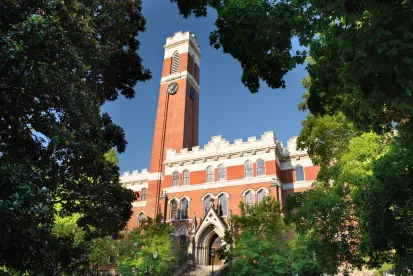A recent federal district court decision addressed how public events, protests, and student articles can shape otherwise-private Title IX proceedings. In Doe v. Washington University, the plaintiff, John Roe, was an undergraduate student who was expelled after the University found he had committed sexual assault. A female student, Jane Roe, had accused him of giving her several alcoholic drinks, rendering her extremely intoxicated, to the point of falling over and vomiting, and then having non-consensual sex with her. The University conducted an investigation, held a hearing, and expelled the plaintiff. The plaintiff alleged that student op-eds, protests, and statements of University officials had tainted the process. The court disagreed.
Op-eds and Protests
The plaintiff sued, alleging that he had been denied a fair process. The heart of his claim was that a series of op-eds in the student newspaper and a student protest had unfairly influenced his proceeding. Shortly after the assault on Jane Roe, a student op-ed criticized the University’s lack of response to reports that a particular male student had committed multiple sexual assaults. The op-ed said the male student had since committed another assault and blamed the University for failing to act. The subject of the op-ed was the plaintiff, but the article did not identify him by name.
The University’s Vice Chancellor responded in an op-ed the next day. She revealed that she too had been a victim of sexual misconduct as a student, which “fuels [her] commitment to strengthen [the University’s] Title IX policies and processes.” While she expressed support for the victims, she stated that the University was “committed to adhering to process” and pointed to its duty to be “thorough and fair to everyone involved in these cases.”
Roe responded by filing a formal complaint and writing an anonymous op-ed, confirming that she was the latest victim of the serial assaulter. She described the incident, blamed the University for inaction, and urged the administration to reform its procedures. That same day, student protests erupted. Roe allegedly was among the protesters, and carried a sign calling for Doe’s expulsion.
The beginning of the University’s investigation of the plaintiff ran parallel to the op-eds and protests. The plaintiff first met with administrators on April 18, the day after the Vice Chancellor’s op-ed, and the University’s Title IX office officially launched proceedings on April 25, the day before the protests. Formal interviews were conducted in August and September and the plaintiff was expelled in November following a panel’s unanimous decision.
In light of the op-eds and protest, the University started a process to strengthen its Title IX procedures. Among other things, the Vice Chancellor met with the leaders of the protest over the summer, and in January of the following year, wrote a comment to the Department of Education’s proposed regulations for Title IX, saying that rolling back protection for victims would “reverse the significant progress” the University had made in addressing sexual assault claims. The Vice Chancellor had informed the plaintiff of his expulsion, but was not a member of the panel that found him guilty.
The Lawsuit
The plaintiff sued, challenging the University’s conclusions and accusing the school of bias in violation of Title IX and state law. While the plaintiff brought several theories, the court rejected them all.
First, the plaintiff had said that the three op-eds, the protest, and the Vice Chancellor’s influence worked in concert to improperly bias the Title IX process against him. The court denied that claim. It refused to hold the University liable for the two student-written op-eds and for the student-led protest. As for the Vice Chancellor, the court “carefully reviewed” her op-ed and determined that it did not show gender bias or bias in favor of the plaintiff’s accusers. Moreover, the Vice Chancellor’s comment on the proposed Title IX regulations occurred “long after” the plaintiff’s proceedings had ended. More importantly, the court explained that “expressing concern or support for the victims of sexual assault is not evidence of gender bias.”
The plaintiff also argued that the University was on notice that its policy was inequitable. He argued that the policy tracked the 2011 Dear Colleague Letter, which the Department of Education had rescinded under the Trump Administration. The court decided that this did not meet the high bar for demonstrating deliberate indifference to the plaintiff’s due process rights.
The plaintiff also accused the University of selective enforcement. He noted that, although he had been accused of multiple sexual assaults, he had cross-complained that one of his female accusers had physically assaulted him. He said that the University failed to investigate that cross-complaint, and instead threatened to punish the plaintiff if he brought formal charges. The court rejected the argument, noting that the female student never faced formal charges. It also stated that any alleged threats by the University would have been empty, as the plaintiff conceded that they were made after his expulsion.
Finally, the plaintiff said the outcome of the proceeding was erroneous. The court disagreed, noting that the plaintiff did not allege particular facts that the University ignored and did not acknowledge clear evidence that the complainant was extremely intoxicated and incapable of consent. In addition, the plaintiff failed to show that the University had been motivated to render an erroneous outcome. While the court acknowledged that external pressure can be enough to bias a Title IX proceeding, this was not that case. The court noted that the other cases had involved much more extreme circumstances. In one case, for example, the New York Post criticized the school, dozens of female students filed Title IX complaints with the DOE, the student newspaper criticized a school official by name, a student petition requested statistics on Title IX assault cases, and a student leader involved in protests had accompanied the complainant to the Title IX hearing. The op-eds in this case “d[id] not create the same inference of public pressure.”
Takeaways
This case highlights the nuanced approach courts take to public influence on Title IX cases. Importantly, administrators can “express[] concern or support for the victims of sexual assault” as long as they are also concerned with the procedural rights of the accused. A court will “carefully review[]” these statements. And while public pressure on administrators can create bias, the threshold appears to be fairly high. In nearly all of the cases cited by the court, public pressure was either “extreme” or was accompanied by other evidence of bias, such as discriminatory statements by a school official, the destruction of critical notes by school officials, or the decision to ignore prosecutors’ specific expressions of doubt about accusations. In other words, the court recognized that officials are still able to give a fair hearing even if students write op-eds and protest.





 />i
/>i

